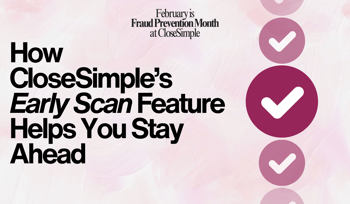Stop Real Estate Fraud: Fraud Prevention Tech & Email Account Protection

The dream of a new home or a successful property sale can quickly turn into a nightmare. Lurking just beneath the surface of many real estate closings is the ever-present threat of fraud. Scammers are becoming more cunning, their tactics more sophisticated, and the financial and emotional fallout for your clients and your company can be devastating.
The key to protecting everyone involved is to spot the danger signs before funds are lost and trust is shattered.
The Anatomy of a Scam: Recognizing the Red Flags of Fraud
Fraudsters often rely on the urgency and complexity of closings to slip their schemes past unsuspecting eyes. Train your team and educate your clients to be vigilant for these critical red flags:
Communication Red Flags: Is That Really Them?
- Sudden Changes in Style or Urgency: An email that suddenly sounds different, perhaps with more errors, an uncharacteristic tone, or extreme pressure to act immediately, should raise suspicion. This is a common sign of email account compromise.
- Look-Alike Email Addresses or Domains: Scammers are masters of subtle deception. An email address might be off by a single letter (e.g., john.doe@titIecompany.com versus john.doe@titlecompany.com where a capital “I” replaces an “l”) or use a slightly different domain. These are typical tactics used in email account compromise.
- Pressure to Use Unfamiliar Channels: If someone insists on communicating only through a new, unverified app or refuses a phone call to discuss important changes, be wary.
- Reluctance for Voice or Video Verification: Especially in situations with remote sellers or last-minute changes, an unwillingness to verify details over a phone or video call is a major red flag.
Instruction and Request Red Flags: Does This Make Sense?
- Last Minute Changes to Wiring Instructions: Legitimate title companies and attorneys very rarely change wiring instructions at the eleventh hour. Treat any such requests as highly suspicious.
- Funds Directed to a New or Different Party or Account: If updated instructions direct funds to a different individual, new bank, or an account name that does not match the seller or expected payee, stop everything immediately.
- Unexpected Fees or Information Requests: Sudden demands for additional “processing fees” or requests for sensitive personal information outside of secure channels are warning signs.
- Mismatched Details: Discrepancies in names, property addresses, loan numbers, or amounts on documents compared to previously confirmed information should trigger an immediate review.
Seller or Party Behavior Red Flags: Is This Person Genuine?
- The “Ghost” Seller: Particularly with vacant land or investment properties, a “seller” who is impossible to reach by phone, communicates only via email or text, and avoids in-person or video meetings is a classic sign of impersonation fraud.
- Too Eager for a Quick, Below Market Cash Sale: Sellers pushing aggressively for a rapid cash closing, often below market value without clear reason, could be fraudsters trying to liquidate quickly.
- Resisting Standard Verification: Sellers who refuse routine identity verification or insist on using their own out-of-area or unvetted notary should raise caution.
- Lack of Property Knowledge: A supposed seller who seems vague or incorrect about specific details of the property they claim to own may not be who they say they are.
Document Red Flags: Do These Look Right?
- Altered or Sloppy Documents: Visible alterations, inconsistent fonts, mismatched signatures, or an unprofessional appearance on official documents are likely indicators of fraud.
- Pressure to Sign Blindly: Attempts to rush you or your clients into signing without adequate time for review may be an effort to slip fraudulent details past you.
Stop, Look, Listen: Your Action Plan to Verify Legitimacy
Spotting red flags is just the first step. Verifying legitimacy is how you stop fraud in its tracks.
- The Golden Rule of Verification: Always verify wiring instruction changes or sensitive requests via a trusted, independent channel. Call the person or company using a phone number independently verified from a previous legitimate source. Never use phone numbers or links provided in suspicious emails.
- Scrutinize Digital Addresses: Teach all parties to carefully check email sender addresses and URLs for inconsistencies
- Establish Secure Communication Protocols Upfront: Clearly communicate how your company will convey sensitive information. Using a secure, branded client portal like CloseSimple centralizes all communications, document sharing, and wiring instructions originating from your verified company domain. This approach effectively counters phishing and email account compromise attempts.
- Question Urgency: Legitimate parties understand the need for diligence. High-pressure tactics are a hallmark of scams.
- Embrace Multi-Factor Authentication (MFA): Ensure MFA is enabled on all company email accounts and systems handling sensitive data. Encourage clients to do the same.
- Leverage Comprehensive Fraud Prevention Technology: Use digital tools like CloseSimple’s Early Scan to assess risk immediately and AI-powered ID verification to protect against impersonation and fraud. These technologies offer a critical layer of defense against fraud in real estate transactions.
Trust Your Instincts: If Something Feels Off, Investigate
Encourage your team and clients to voice concerns and investigate any suspicious activity. Never dismiss that nagging feeling.
If You Suspect Fraud, Act Immediately!
- Stop the Transaction: Do not send any more funds.
- Contact Your Bank Immediately: Request a wire recall or reversal immediately.
- Notify All Relevant Parties: Inform your manager, agents, the other party (if legitimate), and legal counsel.
- Report to Authorities: File a complaint with the FBI’s Internet Crime Complaint Center (IC3) at www.ic3.gov and contact local law enforcement.
Vigilance is Your Victory
Protecting clients from real estate closing fraud requires vigilance, clear security protocols, and the courage to question anything suspicious. By recognizing the red flags, verifying legitimacy rigorously, and deploying advanced fraud prevention technology like CloseSimple, you can significantly reduce risk and uphold the integrity of every closing.
Your clients count on your expertise to guide them safely to closing day.
bogid - 27787114388
Related posts
-2.jpg?length=350&name=Blog%20Images%20(4)-2.jpg)
Resources
Understanding the Importance of Early Scan in Fraud Prevention

Growth & Scale Report
Fraud Busters: How Near North Title Group is Fighting Fraud with Laughter, Storytelling, and a Little Bit of Theater

Article
Crush Fraud, Not Hearts: How CloseSimple’s Secure Portal Redefines Fraud Prevention

Article
Crush Fraud, Not Hearts: How CloseSimple’s Early Scan Feature Helps You Stay Ahead